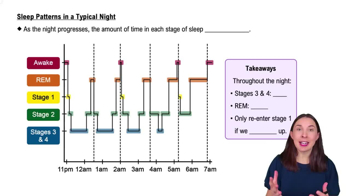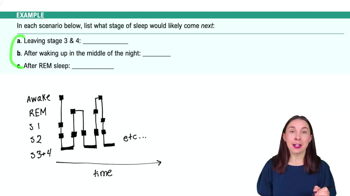Table of contents
- 1. Introduction to Psychology1h 43m
- 2. Psychology Research2h 20m
- 3. Biological Psychology2h 41m
- 4. Sensation and Perception28m
- 5. Consciousness and Sleep32m
- 6. Learning41m
- 7. Memory34m
- 8. Cognition37m
- 9. Emotion and Motivation35m
- 10. Developmental Psychology33m
- 11. Personality48m
- 12. Social Psychology41m
- 13. Stress and Health41m
- 14. Psychological Disorders44m
- 15. Treatment47m
5. Consciousness and Sleep
Sleep
Struggling with Psychology?
Join thousands of students who trust us to help them ace their exams!Watch the first videoMultiple Choice
Lev Vygotsky's _____ refers to the difference between what a child can do alone versus what a child can do with the help of a teacher.
A
concrete operations stage
B
formal operations stage
C
theory of scaffolding
D
zone of proximal development
 Verified step by step guidance
Verified step by step guidance1
Begin by understanding the context of Lev Vygotsky's work, which focuses on cognitive development in children and the role of social interaction.
Identify the key concept in the question: the difference between what a child can do alone versus with help. This is central to Vygotsky's theory.
Review the options provided: 'concrete operations stage', 'formal operations stage', 'theory of scaffolding', and 'zone of proximal development'.
Understand that 'zone of proximal development' (ZPD) is a core concept in Vygotsky's theory, describing the range of tasks that a child can perform with guidance but not yet independently.
Conclude that the correct answer is 'zone of proximal development', as it directly addresses the difference between independent and assisted performance in learning.

 3:25m
3:25mWatch next
Master Circadian Rhythms with a bite sized video explanation from Hannah Gordils
Start learningRelated Videos
Related Practice


































































































![Race, Genes and IQ Differences | Bret Weinstein [Mini Clip]](https://img.youtube.com/vi/IztL_m3pd70/mqdefault.jpg)



































































































